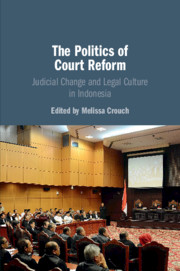Book contents
- The Politics of Court Reform
- The Politics of Court Reform
- Copyright page
- Contents
- Figures
- Tables
- Contributors
- Acknowledgements
- 1 The Judicial Reform Landscape in Indonesia
- Part I Continuity and Change in the General Court System
- Part II Specialised Courts Established under the New Order
- 5 The Religious Courts
- 6 The Administrative Courts
- Part III Specialised Courts as Judicial Reform Strategy
- Part IV Courts and Rights
- Epilogue
- Glossary
- Bibliography
- Index
6 - The Administrative Courts
The Quest for Consistency
from Part II - Specialised Courts Established under the New Order
Published online by Cambridge University Press: 30 August 2019
- The Politics of Court Reform
- The Politics of Court Reform
- Copyright page
- Contents
- Figures
- Tables
- Contributors
- Acknowledgements
- 1 The Judicial Reform Landscape in Indonesia
- Part I Continuity and Change in the General Court System
- Part II Specialised Courts Established under the New Order
- 5 The Religious Courts
- 6 The Administrative Courts
- Part III Specialised Courts as Judicial Reform Strategy
- Part IV Courts and Rights
- Epilogue
- Glossary
- Bibliography
- Index
Summary
This chapter looks at legal certainty in Indonesia’s administrative courts. It provides a brief overview of the genesis and development of this branch of the Indonesian judiciary and then shifts its focus to how administrative court judges interpret and apply so-called ‘general principles of proper administration’ (hereafter ‘General Principles’). These principles are one of the two grounds for which administrative courts can review administrative decrees, the other ground being the violation of a statute or regulation. The choice of these principles as a way of discussing legal certainty is deliberate: from the start of the administrative court system, it was the intention of the legislator and the Supreme Court to develop these principles by means of judicial precedent. This is highly unusual in Indonesian legal practice, where legislative and executive lawmaking have always been dominant and little space is left for judge-made law. In other words, if ever there has been a field of law in Indonesia in which the judiciary is well-positioned to take the lead in developing consistent legal rules, it is in this one. Despite positive developments in the conditions for consistent interpretation, this objective has not been achieved yet – although the situation is better than in the civil and criminal courts.
- Type
- Chapter
- Information
- The Politics of Court ReformJudicial Change and Legal Culture in Indonesia, pp. 133 - 148Publisher: Cambridge University PressPrint publication year: 2019
- 1
- Cited by



